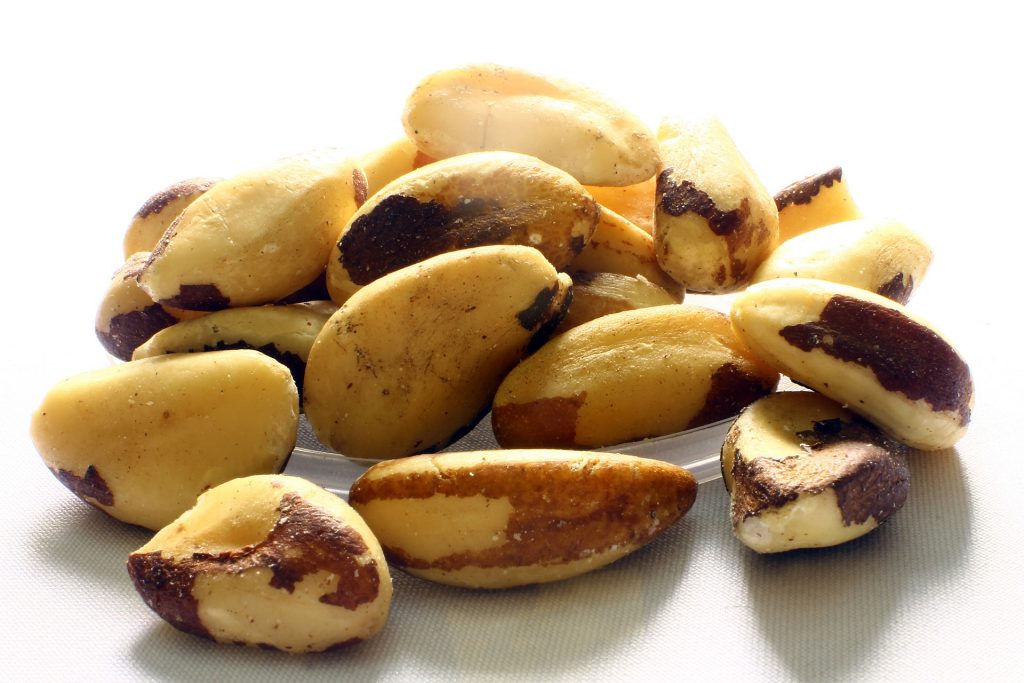The Health Benefits of Brazil Nuts

Brazil nuts are a nut from South America that is rich in the nutrient selenium. While the amount can vary from nut to nut, two brazil nuts average around 50 micrograms of selenium and have been shown to improve selenium status in the body (Thomson 2008).
Selenium is an important nutrient involved in antioxidant protection. Research indicates that selenium may help protect from cancer, neurodegenerative diseases and thyroid problems.
Selenium and Cancer
The relationship between selenium and cancer is complex. Initial observational studies suggested diets higher in the mineral decreased risk of cancer, specifically breast, lung, esophageal, gastric, and prostate cancer. However, interventional trials with selenium supplements did not seem to yield the same benefits (Cai 2016).
Some studies overall have tried to argue that selenium has no effect on cancer and selenium supplements may even increase risks (Vinceti 2018). However, they acknowledge that we need more data on specific forms of selenium or that certain populations may still benefit. If there are benefits for cancer with selenium, it likely only comes from food-based selenium like brazil nuts.
Selenium and Neurodegenerative Diseases
Data is starting to show that brazil nuts may help support brain health. One brazil nut daily was shown to improve cognitive function in patients with cognitive impairment (Cardoso 2016). In addition, studies show a link between selenium status and Alzheimer’s disease. Selenium may help prevent Alzheimer’s disease and prevent cognitive decline (Solovyev 2018).
Brazil Nuts and Thyroid Function
Selenium and brazil nuts also appear to help thyroid function. A trial of eating a single brazil nut daily in dialysis patients deficient in selenium showed significant improvement in thyroid hormone levels (Stockler-Pinto 2015). Studies on selenium supplementation also show benefits in treating autoimmune thyroid problems, although more data would help flesh out our understanding further (Kohrie 2015).
Brazil Nuts and Cardiovascular Benefits
Studies looking at risk factors for heart disease seem to indicate potential benefits on cholesterol and lipids with brazil nuts, although not all studies were fully in agreement (Cardoso 2017). Some of the studies showed cardiovascular benefits even with defatted brazil nut powder, indicating that the benefits may come from more than just the beneficial fats found in the nuts.
Controversies
Radioactivity
Brazil nuts are one of the most radioactive foods. While this may sound scary, levels are well below safety levels for exposure to radioactive elements and brazil nuts likely do not pose a risk due to their radioactivity (Mazokopakis 2018).
Diabetes
There’s also some data indicating that high selenium intake could increase risk of diabetes (Vinceti 2018). The association with diabetes was shown with low and high blood levels of the mineral. However, a study with 130 healthy volunteers who consumed one brazil nut daily for 8 weeks had significantly lower blood sugar at the end of the study (Donadio 2018). While preliminary, the data appears to indicate that brazil nuts could be protective from diabetes and blood sugar problems.
Fungal contaminants
Brazil nuts can contain aflatoxin, a highly toxic compound from mold growth sometimes found in certain foods. Peanuts also are commonly contaminated with aflatoxin. The Brazilian government has stepped up efforts along with producers to try and limit aflatoxin in brazil nuts and more recent studies appear to indicate significant success in reducing aflatoxin levels in nuts (Cardoso 2017). If a brazil nut looks moldy or if it tastes bad, it’s best not to eat it.
Conclusion
Brazil nuts are a rich source of selenium that may have health benefits, especially as a dietary source of selenium. I personally like to use brazil nuts in my morning smoothie and have prescribed them for thyroid problems.



